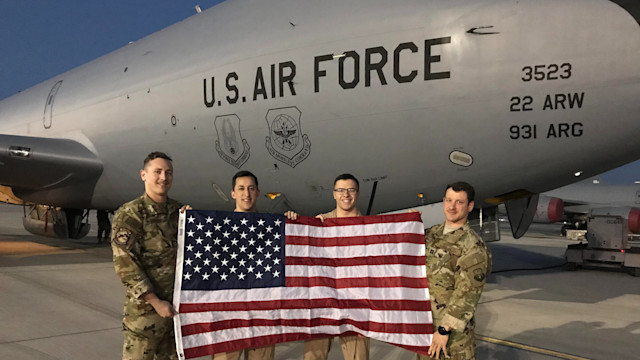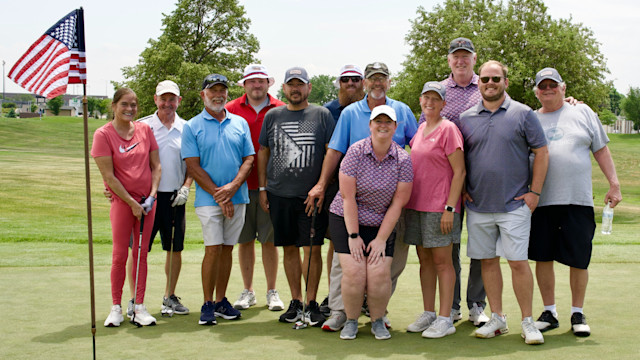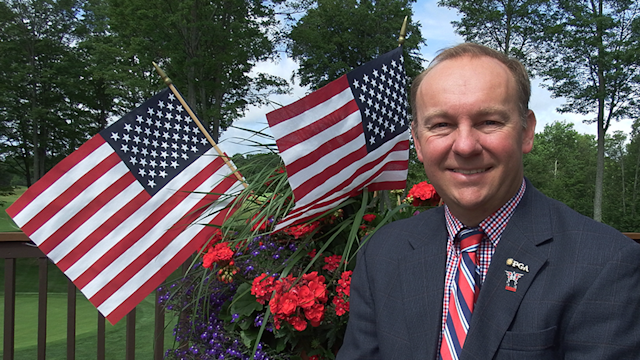Game Changers
Army Veteran Charlie Wilcox Shares How Golf, PGA HOPE Help Him 'Live Again'
By Jay Coffin
Published on

There was a time, not that long ago, when Charlie Wilcox could not walk into a store alone. The effects of post-traumatic stress disorder were so severe that he simply could not be around large groups of people.
“It was pretty bad,” the retired U.S. Army Sgt. said. “Between my anxiety and my anger, I just couldn’t. I couldn’t have a conversation with anyone. I was so pissed off about everything. I can laugh now, but I’m thankful for all the help I got from everyone around me. My sister, my family, my father and friends said, ‘We love you, but you either figure this out or you end up dead.’”
Thankfully, Wilcox chose the former, though it was not as easy as it may seem.
Wilcox, 56, was born in Danbury, Connecticut, and moved to New Jersey at age 9 when his father received a job transfer. He played soccer, baseball and basketball as a youngster. Golf was never his thing.
Following high school, Wilcox wasn’t exactly sure what he wanted to do with his life. So he attended a vocational-technical school and learned how to become an electrician.
“After a year, it wasn’t for me,” Wilcox said. “So I went down to Main Street to the recruiters and they said, ‘Let’s see what we can do.’”
That was the first step in what would become a 22-year Army career.
“I started with a three-year enlistment; it was something that I enjoyed,” Wilcox said. “It was a comfortable thing for me. Then, all of a sudden, three years turned into 22.”
Starting in 1987, the first three years were spent at Fort Knox in Kentucky, and then Wilcox jumped around for most of the next decade. He describes his first 14 years in the service as “standard,” saying that he simply was training for what he may be called to do one day.
Then the September 11 terrorist attacks happened in 2001, and 16 months later Wilcox was off to Iraq for one of four different deployments – two with the 10th Mountain Division, then another two with the 101st Airborne Division – over a five-year span. Wilcox was part of a transportation unit and helped escort convoys to different locations.
“It was always a lot of mayhem,” he recalled. “You’re moving such a large group of people, it’s difficult. Just to keep track of what’s going on is mind-boggling. You have 100,000 troops, and vehicles and people are taking vehicles from others because they can’t find theirs. It was crazy.”
It was also relatively common for Wilcox and his squad to be targeted by gunfire, and on more than one occasion an improvised explosive device (IED) blew up parts of his convoy. No one in his immediate groups ever died, but he knows that others were not so fortunate.
Wilcox returned from his last deployment in late 2007 and was granted his final release in ’09, marking 22 years of service.
“You just become such an adrenaline junkie,” Wilcox said.
“After my last tour, things started getting a little crazy for me. I can’t say I wasn’t aware of it, but I didn’t want to realize it,” he continued. “I was in a leadership position in my Army career. When you’re in that position it’s, I don’t have a problem; everyone else has a problem. You’re in denial. It’s an affliction for a lot of Veterans, and unfortunately, many don’t get the help that they need.”
Wilcox is not afraid to talk about his PTSD, and he’s extremely open when discussing the process he went through to come out healthier on the other side. The first step was agreeing to enter a four-month in-patient program at the Lyons VA Medical Center in New Jersey. He admits that he only went the first time because people wanted him to, not by his own volition. He went back another time, and then again, and then again. Slowly, Wilcox realized that he was better prepared to deal with things that he wasn’t before. He spent five stints in the in-patient program, for a total of 24 months.
“That’s the way it needed to be done,” he said. “Little by little, it started sinking in. I started grasping their methods on how to deal with this. It’ll never go away, but you just have to learn how to incorporate it better into your life. You find the things that work for you to deal with. Not everything works the same for everybody. We’re all different. When I finally found out what worked for me, life’s been great.”
Wilcox was never married and does not have any children, so it’s golf that plays a huge role in what works for him now.
A 14 handicap, he never dreamed that the game he picked up casually the first few years in the Army, back in the late 1980s, would now be one of the things that brings him so much joy.
There is a nine-hole course and driving range adjacent to the Lyons VA. Although Wilcox didn’t have much money, or golf clubs, and still didn’t love being around groups of people, he ventured to the range in 2015 and was told he should do research on PGA HOPE, which introduces golf to Veterans and Active-Duty Military to enhance their physical, mental, social and emotional well-being.
Attending lessons and becoming part of the program eventually turned into a seasonal gig where he and Glenn Hockman both work full-time at the range during the summers. Wilcox has been so helpful with the PGA HOPE program there that he was named an Ambassador representing the New Jersey PGA Section and attended National Golf and Wellness Week in Washington, D.C. last fall.
“He was in need and I had services to provide and he took to them right away,” said Hockman, an Air Force Veteran who works the shop and handles all the logistics of the range, while Wilcox is in charge of mowing and picking the range, and making sure all the equipment is in working order. “It’s why we’re here. PTSD is a dangerous thing.
“People who know me and Charlie, it’s a friendship that you have to witness to see. We’ve done so much for each other. It just works.”
Mike Jaborek was captain of Wilcox’s squad last October during their Ambassador trip, when they were treated like members at Congressional Country Club. At the end of the week Jaborek presented Wilcox with a guidon, which is a great source of pride to receive in the military.
“He’s a big intimidating guy but has a heart of gold,” Jaborek said. “He is so gracious and thankful and was always willing to take one for the team. He was a perfect example of everything I wanted from someone on our squad.”
Wilcox still has his battles. Arthritis is spread throughout his body, and he has hearing loss from firing weapons so often during his military days. But his service dog Stella has been a huge help, as has been his immediate family and golf family – connections that run so deep that last fall he was able to play prestigious Pine Valley and Baltusrol with Dr. Roger Nettune.
“Come on, man … ,” Wilcox laughed. “I’ve gone from the battlefield to Pine Valley.”
Grateful. It’s a word that Wilcox uses often. He’s prevailed through many dark times to get to where he is now, where his goal remains constant – to have more good days than bad.
“Golf and PGA HOPE have allowed me to live again,” he said. “I have an outlet to make friendships and to be out in society. I was in society, and I didn’t enjoy it all that much. Now I can enjoy it again.”


